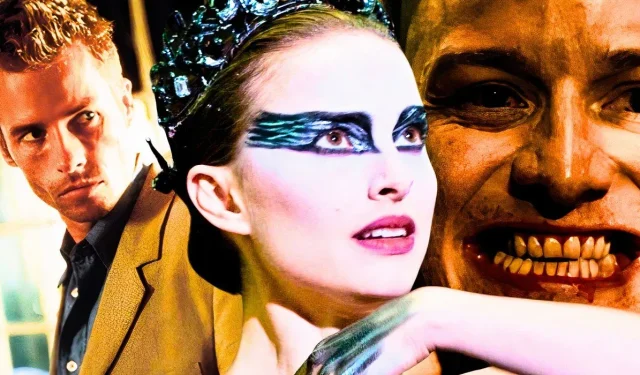Films such as Black Swan enthrall viewers by exploring the complex terrain of obsession, psychological disintegration, and the relentless quest for artistic excellence. Darren Aronofsky’s Black Swan stands out as a psychological thriller that masterfully blurs the lines between reality and madness, showcasing Natalie Portman’s character, Nina, as she succumbs to the overwhelming pressures of her ballet career. Its compelling narrative delves into themes of fractured identities, paranoia, and the darker facets of ambition. While the psychological depth and visual artistry of Black Swan cement its status as a cinematic masterpiece, numerous other films evoke a similarly haunting atmosphere.
Several remarkable movies resonate with Black Swan by exploring themes of psychological unraveling, identity crises, and the sacrifices demanded in the pursuit of greatness. Through unreliable narratives, unexpected twists, and poignant character studies, films that echo Black Swan challenge our understanding of reality. From the fragmented psyches in Fight Club and Split to the artistic anguish depicted in Whiplash and Birdman, each of these films shares the unsettling brilliance that has elevated Aronofsky and Portman’s 2010 psychological thriller to modern classic status.
10. Split (2016)
Directed by M. Night Shyamalan
Split, one of M. Night Shyamalan’s finest creations, features a compelling performance by James McAvoy as a man suffering from dissociative identity disorder who kidnaps three teenage girls. As he showcases 23 personalities, a more sinister 24th persona lurks within him. This film profoundly aligns with Black Swan in its exploration of psychological fragmentation and trauma’s toll. Both narratives center on protagonists grappling with fractured identities, as seen in Kevin’s multiple personalities and Nina’s mind inhibiting her under immense pressure.
Akin to Black Swan, Split integrates elements of body horror into psychological terror, with physical transformations reflecting the deteriorating mental states of both Kevin and Nina. The narrative structure artfully employs unreliable perspectives that compel the audience to question the nature of reality. Notably, a dance sequence featuring one of Kevin’s alters, Hedwig, serves as a twisted reflection of Nina’s obsession with ballet. For admirers of Black Swan, Split delves into a gripping psychological analysis where the mind serves as the ultimate battlefield.
9. Pi (1998)
Directed by Darren Aronofsky
Pi, Aronofsky’s captivating directorial debut, garnered critical acclaim upon its release and remains one of the most impressive debuts to this day. This black-and-white psychological exploration addresses themes of religion, mathematics, mysticism, and mental illness, chronicling the journey of a mathematician obsessively searching for a number that unravels the universe’s patterns. Much like Black Swan, Pi delves into themes of obsession and paranoia, showcasing Aronofsky’s commitment to exploring the depths of the human psyche.
The visual style in Pi—with its stark, monochromatic cinematography—mirrors the disorienting and claustrophobic atmosphere present in Black Swan. Both central characters, Max and Nina, grapple with harrowing visions and delusions that propel them toward self-destruction. The haunting score complements the harrowing visuals, intensifying the emotional stakes and mirroring the suicidal descent into madness faced by the protagonists. For fans of Black Swan, Pi serves as an essential viewing that navigates the perils of relentless obsession.
8. The Machinist (2004)
Directed by Brad Anderson
The Machinist, released in 2004, became infamous largely due to Christian Bale’s drastic weight loss that left him looking skeletal. Bale’s performance, which closely parallels Portman’s portrayal of Nina, is a compelling reason to regard The Machinist as an essential companion to Black Swan. The film follows Trevor Reznik, a machinist plagued by severe insomnia, whose mental fatigue culminates in a catastrophic workplace accident, launching him into a downward spiral of despair and paranoia.
In both narratives, the protagonists grapple with their realities while contending with overwhelming pressures—be it Trevor’s obsession with uncovering a conspiracy or Nina’s pursuit of artistic triumph. The haunting tone resonates throughout both films, enhanced by eerie cinematography and unreliable narrators blurring the lines between their perceived and actual realities.
7. Birdman or (The Unexpected Virtue of Ignorance) (2014)
Directed by Alejandro G. Iñárritu
Birdman, featuring an ensemble cast led by Michael Keaton, Edward Norton, and Emma Stone, was both a critical and commercial triumph. Filmed in a single continuous shot, it chronicles the life of a washed-up actor, renowned for his role as a superhero, who endeavors to revive his faltering career with a Broadway play. The meta-commentary on performance is intriguing, considering Keaton’s history with Batman, paralleling the pressures faced by both him and Nina.
Both Birdman and Black Swan explore the high stakes of artistic perfection, depicting characters on the verge of collapse. Riggan Thomson (Keaton) and Nina both lose themselves in their crafts, haunted by visions that distort reality. Iñárritu’s cinematic techniques evoke a dreamlike state, akin to Aronofsky’s immersive direction. The shared themes surrounding the rigorous demands of performance highlight how the world of theater and ballet can lead to self-destruction as each character seeks greatness.
6. Nightcrawler (2014)
Directed by Dan Gilroy
Nightcrawler emerged through the creative collaboration between writer-director Dan Gilroy and lead actor Jake Gyllenhaal. Celebrated for both Gilroy’s script and Gyllenhaal’s chilling performance, the story critiques unethical journalism and reflects society’s appetite for sensationalism, following a stringer who captures violent crime scenes across Los Angeles to sell to news outlets. While it may initially appear unrelated to Black Swan, it encapsulates the disturbing extremes of ambition.
Nina Sayers and Louis Bloom (Gyllenhaal) demonstrate an obsessive drive to achieve their goals, pushing themselves toward perilous limits. Similar to Black Swan, Nightcrawler immerses viewers in its protagonists’ downward spirals, leveraging compelling cinematography that combines dynamic close-ups with voyeuristic framing. The murky nighttime backdrop in Nightcrawler mirrors the theatrical world of Black Swan, revealing how both characters sacrifice their ethics—and ultimately, their humanity—in their relentless quests for success.
5. Requiem for a Dream (2000)
Directed by Darren Aronofsky
Requiem for a Dream is often considered Aronofsky’s crowning achievement, second only to Black Swan. With powerful performances from Jared Leto, Jennifer Connelly, Ellen Burstyn, and Marlon Wayans, the film’s atmosphere of despair and isolation is heightened by its gripping narrative. Centering on four individuals affected by addiction, it reflects their desperate yearning for fulfillment and love while leading them to devastating choices.
Thematically, Requiem for a Dream connects deeply with Black Swan through its nightmarish portrayal of obsession and addiction. Aronofsky employs striking visual choices that, similar to Black Swan, include disorienting imagery and compelling sound design, immersing the audience in the protagonist’s unraveling mental states. The urgent editing and jarring visuals in Requiem for a Dream effectively amplify the film’s psychological horror, making it an essential viewing for those drawn to character-driven narratives that challenge the boundaries of obsession.
4. Memento (2000)
Directed by Christopher Nolan
Memento, a groundbreaking thriller, marked a pivotal moment in director Christopher Nolan’s career. As his second feature film, it garnered Academy Award nominations, asserting its place as a quintessential example of non-linear storytelling, with intertwining timelines revolving around Leonard, a man suffering from anterograde amnesia, who relentlessly seeks to discover and avenge his wife’s murderer.
Both Memento and Black Swan illustrate the intricate interplay of unreliable memory and fragmented identities. Leonard’s struggle to piece together his reality resonates with Nina’s own confrontations with her deteriorating grasp of self. Nolan’s clever narrative structure evokes confusion, which parallels the disorienting shifts in perspective within Black Swan. Driven by themes of loss, obsession, and self-deception, Memento emerges as an exemplary psychological thriller for those captivated by Black Swan‘s exploration of the human psyche.
3. The Prestige (2006)
Directed by Christopher Nolan
The Prestige, another Nolan classic, shares profound thematic concerns with Black Swan. Both films delve into the lengths individuals go to perfect their artistry, portraying intense rivalries within the world of magic. It follows two magicians whose friendship turns malignant as they vie for superiority, intertwining their fates through cruelty and deception.
Like Black Swan, The Prestige scrutinizes obsession and the sacrifices made for artistic mastery. The relentless pursuit of success showcased through Alfred Borden (Bale) and Robert Angier (Jackman) parallels Nina’s dedication to achieving perfection in ballet. Themes of duality saturate both films—the transformation of Nina into her Black Swan counterpart echoes the dark depths explored in The Prestige. Nolan’s narrative craftsmanship intertwines with Aronofsky’s storytelling, revealing the harrowing realities associated with artistic sacrifices.
2. Whiplash (2014)
Directed by Damien Chazelle
Whiplash represents another powerful exploration of artistic ambition and the steep price that often accompanies it, resonating deeply with the themes of Black Swan. Directed by Damien Chazelle, this critically acclaimed film follows an aspiring drummer who grapples with the harrowing demands of his intimidating mentor at a distinguished musical conservatory. Much like Nina, Andrew Neiman discovers the harsh requirements necessary to achieve greatness, along with the sacrifices it entails.
The comparisons between Whiplash and Black Swan emerge strikingly, as both narratives depict young artists on the verge of collapse under the weight of perfectionism. Nina’s encounters with her demanding ballet instructor parallel Andrew’s psychological torment under the hands of his abusive music teacher, Terence Fletcher. As both stories caution against the dark side of artistic ambition, the intense visuals and pulsating soundscapes join forces to enhance the gripping narrative found in Whiplash.
1. Fight Club (1999)
Directed by David Fincher
Fight Club, helmed by David Fincher, is arguably one of the most iconic films in cinema history and stands out as the pinnacle of films akin to Black Swan. Despite its initial mixed reviews, it has since attained cult classic status. Based on Chuck Palahniuk’s novel, the narrative follows an unnamed narrator tormented by insomnia and dissatisfaction with his life. His life takes an unexpected turn when he encounters Tyler Durden, who introduces him to a raw, rebirthing experience through fight club.
Similar to Black Swan, Fight Club dives into themes of identity crisis, psychological fragmentation, and self-destruction. Both Nina and the unnamed narrator wrestle with dissociative experiences, creating alternate personas to cope with the pressures they face. The surreal visuals, the unreliable narrator, and the descent into chaos make Fight Club an indispensable psychological thriller for fans of Black Swan. Although many films might mimic Black Swan in storyline, none quite illuminate the pressure of modernity on the psyche like Fight Club.


